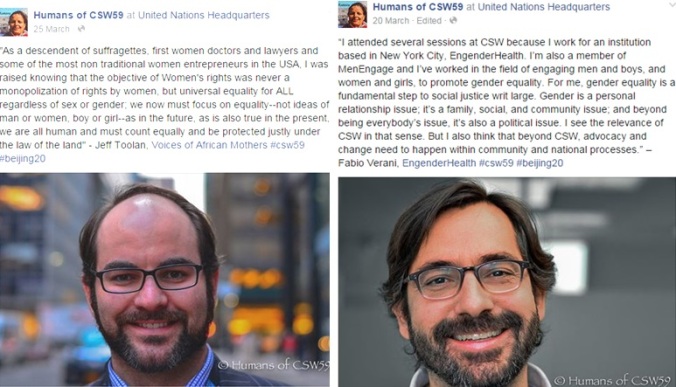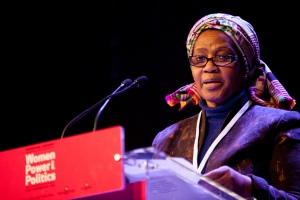by Robert Lutz

A collage of individuals who attended the UN Commission on the Status of Women at the UN Headquarters in New York 2015. All photos by Robert Lutz.
——————————————————————————————————-
Robert Lutz discusses his journey to carve a role for men in feminism and the importance of having a platform for male and LGBT voices in discussions on gender issues.
——————————————————————————————————-
I was not born a feminist; I became one over time. It happened in college when I learned first-hand about the way patriarchy hurts people—my family, friends, strangers, and myself. I went through a period during which I was very ashamed of myself, reflecting on all those times when I had been, frankly, a shitty person trying to “be a man”. I also blamed myself for reaping the benefits of white male privilege.
I did not like being a man much during that time, but I also felt strongly that being a man was the foundation of my identity. When I participated in feminist activism as a “male ally”, I thought a lot about who I was and about my role in the feminist space.
I recognized the importance of simply listening and showing support, yet having only an ally role made me feel disempowered. I felt that I had a personal stake in the struggle for gender equality: beyond advancing women’s rights, I wanted men to rid themselves of the constraints of patriarchy on their lives as well. In short, I always thought feminism should focus on gender issues as opposed to women’s issues alone.
In the last few years, I have met a lot of men who are passionate about promoting gender equality and are interested in figuring out the role of men in feminism. Men’s studies is a growing field and there is a global alliance of organizations working with men and boys to promote gender equality. Both platforms explore how gender shapes the options men have at their disposal, to live lives of their own choosing.

Individuals speaking out for gender equality at the 59th Committee on the Status of Women
https://www.facebook.com/humansofcsw59/timeline
In case you are wondering, these groups and studies have nothing to do with anti-feminist men’s rights activists who claim (most visibly in online spaces) that women are systematically oppressing men. This is immediately apparent from the inclusion of women at the grassroot and policy levels of these studies. The president of the American Men’s Studies Association is a woman and organizations such as White Ribbon and MenEngage work in coordination with women’s organizations with the explicit goal of ending violence against women.
In the growing global movement to engage men and boys for gender equality, the role of men in feminism is becoming increasingly important. Should men just be allies or do we need a distinct platform?
While male allies are crucial to feminism, many organizations feel it is important to highlight men’s well-being issues too. Men reap many privileges on account of their gender, yet the demands of patriarchy deprive men of caring relationships to themselves and others, induce greater risk-taking behavior, and lead to reduced quality of life and early death.
And consider that the vast majority of violence against both men and women, is perpetrated by men. It seems wise to consider violence prevention as a matter of public health that needs to be addressed by tackling attitudes from childhood.
I recently attended the International Conference on Masculinities (ICM) and the United Nations’ 59th session of the Commission on the Status of Women (CSW59), both held in New York City.It is no wonder that UN Women’s Executive Director Phumzile Mlambo-Ngcuka spoke at the ICM, given that she once again highlighted the importance of men and boys for the women’s movement. The empowerment of men in the women’s movement was quite the buzz at CSW59, yet most of the conversations I observed focused on the men-as-allies model.

UN Women Executive Director Phumzile Mlambo-Ngcuka.
Image source: Julie Lunde Lillesæter/PRIO
I want to finish this piece by highlighting three example of how nurturing the role of men in the debate on gender equality can benefit feminism.
The Victim/Perpetrator Binary: When we view men as the sole beneficiaries and perpetrators of patriarchy, we get trapped in a vision of women as the victims and men as perpetrators. This limits how we think about the lived experience of individual men and women. For example, both men and women experience intimate partner violence, sexual violence, and stalking. When we recognize that fighting patriarchy is the common ground men and women share, we can get much further.
LGBTQI Issues: The victim/perpetrator binary also makes it harder for people who do not fit neatly into the gender boxes to receive support. When we oppose men and women, how do we conceptualize gay or trans lives, for instance? Here, the delineations between feminine and masculine, man and woman fail. Why make it harder for people and stigmatize them as a “special group”? Let’s be inclusive instead.
Real Equality vs. Legal Rights: The women’s movement has a rich history of successes, especially in the legal arena, but we are far away from real gender equality. To get there, we need to change the hearts and minds of men, as they make up half of the world’s population. We need to listen to men and help them live better, healthier lives. And, while we are at it: listening does not mean supporting the constant whining of the MRAs. Stop giving them a platform: they get way too much media attention these days.
Visit Humans of CSW59 to see more activists talking gender equality at the Commission on the Status of Women 2015.